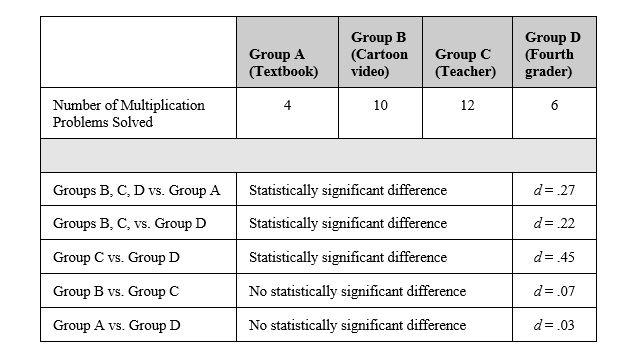Essay
RESEARCH STUDY 9.3
Dr. Phillips is a cognitive-developmental psychologist who studies how children learn mathematical principles. His current interest is in studying how children learn multiplication. He recruits 54 second graders who have not yet learned how to multiply numbers to participate in his study. He is curious as to whether different teaching styles lead to better mastery of the subject. One condition (A) involves having students read a chapter on multiplication from their textbook. One condition (B) involves having students watch a video of cartoon characters explaining multiplication. One condition (C) involves having students being taught multiplication from a teacher. One condition (D) involves having students being taught multiplication by a fourth grader. In all conditions, participants spend 30 minutes learning the fundamentals of multiplication and are then given the same 15-question multiplication test. The number of questions answered correctly is recorded. The data are below.

-Refer to Research Study 9.3 above to answer the following question.
Using Dr.Phillips's study as an example,explain the difference between a control group and a comparison group.Why did Dr.Phillips's study not have a control group?
Correct Answer:

Verified
Students should state that a control gro...View Answer
Unlock this answer now
Get Access to more Verified Answers free of charge
Correct Answer:
Verified
View Answer
Unlock this answer now
Get Access to more Verified Answers free of charge
Q5: RESEARCH STUDY 9.2<br>Dr. Acitelli studies sleep and
Q6: RESEARCH STUDY 9.1<br>Dr. Lonsbary is a cognitive
Q7: What type of experimental designs is affected
Q8: Which of the following is NOT a
Q10: Using a matched-group design is especially important
Q11: Dr.Kline,an environmental psychologist,conducts a study to examine
Q12: RESEARCH STUDY 9.1<br>Dr. Lonsbary is a cognitive
Q14: Which of the following is NOT true
Q49: Explain why experiments are better than your
Q64: Define manipulation checks and pilot studies, and